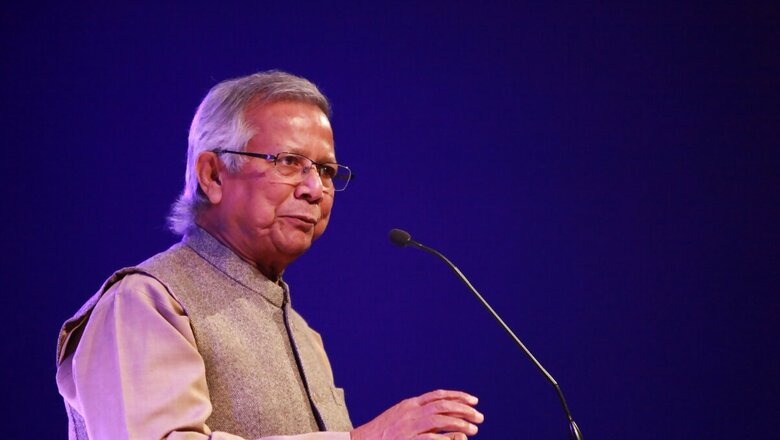
views
Bangladesh’s Nobel-winning microfinance pioneer Muhammad Yunus, who is set to lead an interim government, has called for calm in the country after mass protests forced longtime prime minister Sheikh Hasina to flee. His appointment came quickly after student leaders called on the 84-year-old — credited with lifting millions out of poverty — to lead the country.
“Let us make the best use of our new victory. Let us not let this slip away because of our mistakes. I fervently appeal to everybody to stay calm. Please refrain from all kinds of violence," Yunus said in a statement released on Wednesday, according to bdnews24. “I appeal to all students, members of all political parties and non-political people to stay calm. This is our beautiful country with lots of exciting possibilities. We must protect and make it a wonderful country for us and for our future generations," he added.
‘Stay calm’
Yunus urged everyone to work together and build Bangladesh instead of resorting to violence. “Our youth is ready to give this leadership in creating a new world. Let us not miss the chance by going into any senseless violence. Violence is our enemy. Please don’t create more enemies. Be calm and get ready to build the country."
The decision to appoint Yunus as leader of the interim government was made in a meeting with President Mohammed Shahabuddin, the heads of the army, navy and air force, and student leaders. “(They) decided to form an interim government with Professor Dr Muhammad Yunus as its chief," Shahabuddin’s office said in a statement. “The president has asked the people to help ride out the crisis. Quick formation of an interim government is necessary to overcome the crisis."
Yunus will have the title of chief advisor, according to Nahid Islam, one of the leaders of Students Against Discrimination who participated in the meeting. Shahabuddin agreed that the interim government “will be formed within the shortest time" possible, Islam told reporters, describing the meeting as “fruitful". However, there were few other details about the planned government, including the role of the military.
Due to return on Thursday
Yunus, who is currently in Europe and is due to return to Dhaka on Thursday afternoon, told AFP he was willing to lead the interim government. “If action is needed in Bangladesh, for my country and for the courage of my people, then I will take it," he said in a statement. The veteran academic wrote in The Economist that he wanted to “ensure a free and fair election is held within a few months", calling on a new generation of leaders to step forward. “Above all, we need young people who are not obsessed with settling scores, as too many of our previous governments were," Yunus wrote.
Hasina, 76, resigned on Monday as hundreds of thousands of people flooded the streets of Dhaka demanding she stand down. Monday’s events were the culmination of more than a month of unrest, which began as protests against a plan for quotas in government jobs but morphed into an anti-Hasina movement. Hundreds of people were killed in the crackdown, but the military turned against Hasina on the weekend and she was forced to flee in a helicopter to neighbouring India. Army chief General Waker-Uz-Zaman said on Sunday it was “time to stop the violence".
The president dissolved parliament on Tuesday, another demand of the student leaders and the major opposition Bangladesh National Party (BNP). The head of the police force, which protesters have blamed for leading Hasina’s crackdown, was sacked on Tuesday, the president’s office said in the statement announcing Yunus as leader. Ex-prime minister and BNP chairperson Khaleda Zia, 78, was also released from years of house arrest.
Political prisoners have been released, including Michael Chakma, an Indigenous activist incarcerated in a secret prison since 2019, his United People’s Democratic Front party said on Wednesday. And the military reshuffled several generals, demoting some seen as close to Hasina, and sacking Ziaul Ahsan, a commander of the feared Rapid Action Battalion paramilitary force.
Since Tuesday, streets in the capital have been largely peaceful — with shops opening and international flights resuming at Dhaka airport — but government offices remained mostly closed. Monday was the deadliest day since protests began, with at least 455 people killed since early July. Some businesses and homes owned by Hindus — a group seen by some in the Muslim-majority nation as close to Hasina — were also attacked.
(With agency inputs)
Catch the latest developments on Bangladesh Unrest with our live blog.



















Comments
0 comment